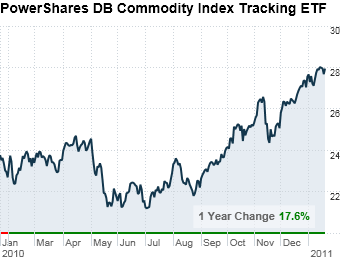
As demand for aluminum, zinc and copper continues to mount in emerging markets, it would be wise to add extra exposure through the PowerShares DB Base Metals fund (DBB), said Tom Lydon, president of Global Trends Investments and editor of ETFTrends.com.
And demand for food will continue to rise alongside worldwide population growth, making agricultural commodities a smart play over the next few years, said Bill Witherell, chief global economist at Cumberland Advisors. He recommends the PowerShares DB Agriculture Fund (DBA), which invests in corn, wheat, soy beans and sugar and other agricultural commodities. The Market Vectors Global Agribusiness ETF (MOO) is another good bet. Market Vectors invests in stocks that stand to benefit from increasing agricultural demand, like Potash (POT), Monsanto (MON) and Deere & Co (DE).
Don't buy: Most commodity ETFs are easy to grasp because they track the performance of an index or in some cases, are backed by a physical commodity, like the SPDR Gold Trust (GLD).
But others are slightly more complicated and can be a risky investment. For example, the United States Oil Fund (USO) tracks the price of crude oil by buying crude oil futures contracts and other oil related futures, forwards, and swap contracts.
While it is widely traded and used by both institutional and retail investors, shareholders who don't understand the different intricacies of the oil futures market can be "rudely surprised" by the somewhat esoteric fund, said Matt Hougan, president of ETF analytics and editor of IndexUniverse.
NEXT: Bond funds
